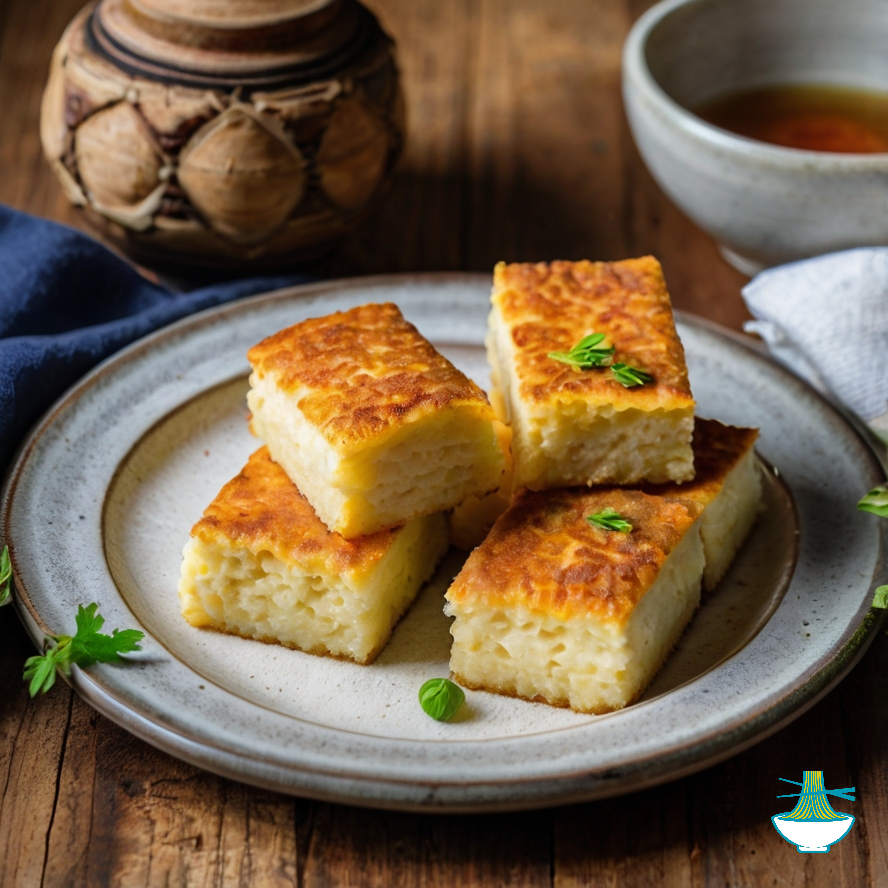Learn how to make Mbeju, a traditional Paraguayan delicacy crafted from cassava flour and cheese. This gluten-free starch cake, cooked to golden perfection on a griddle, offers a delightful blend of flavors and textures. Discover the steps to create this savory treat at home!
Ingredients:
- 2 cups cassava flour
- 1 cup grated cheese (traditional options include queso fresco or mozzarella)
- 1/2 cup milk
- 2 tablespoons butter, melted
- 1/2 teaspoon salt (adjust to taste)
- Additional butter or oil for cooking
Instructions:
1-In a mixing bowl, combine the cassava flour, grated cheese, melted butter, and salt. Mix well until the ingredients are evenly distributed.
2-Gradually add the milk while kneading the dough until you achieve a smooth and pliable consistency. The dough should hold together without being too dry or too sticky.
3-Divide the dough into equal portions and shape each portion into a ball.
4-Heat a griddle or non-stick skillet over medium heat. Add a little butter or oil to grease the surface.
5-Flatten each dough ball into a disc shape, about 1/4 to 1/2 inch thick.
6-Carefully place the flattened dough discs onto the heated griddle or skillet. Cook for about 3-4 minutes on each side, or until golden brown and crispy.
7-Once cooked, transfer the Mbeju to a serving plate and serve warm.
8-Mbeju can be enjoyed on its own or paired with toppings such as butter, jam, or dulce de leche.
9-Store any leftovers in an airtight container in the refrigerator. Reheat in a skillet or microwave before serving.
Enjoy your homemade Mbeju!
Nutritional Values :
Cassava Flour (2 cups):
- Calories: 660
- Carbohydrates: 164g
- Protein: 2g
- Fat: 0g
- Fiber: 8g
benefits:
- Gluten-Free: Cassava flour is naturally gluten-free, making it suitable for individuals with gluten sensitivities or celiac disease.
- Rich in Carbohydrates: Provides a good source of energy due to its carbohydrate content.
- Dietary Fiber: Contains dietary fiber, which supports digestive health and may help with weight management by promoting feelings of fullness.
- Source of Resistant Starch: Cassava contains resistant starch, which acts as a prebiotic, nourishing beneficial gut bacteria and supporting gut health.
Grated Cheese (1 cup, mozzarella):
- Calories: 168
- Carbohydrates: 2g
- Protein: 28g
- Fat: 14g
- Fiber: 0g
benefits:
- Protein: Cheese is a good source of protein, which is essential for building and repairing tissues in the body.
- Calcium: Rich in calcium, which is important for bone health and muscle function.
- Vitamin B12: Contains vitamin B12, which is essential for nerve function and the production of red blood cells.
- Conjugated Linoleic Acid (CLA): Some types of cheese, including mozzarella, contain CLA, a type of fatty acid that may have antioxidant and anti-inflammatory properties.
Milk (1/2 cup, whole milk):
- Calories: 75
- Carbohydrates: 6g
- Protein: 4g
- Fat: 4g
- Fiber: 0g
benefits:
- Calcium: Milk is a rich source of calcium, essential for bone and teeth health.
- Protein: Provides high-quality protein, which is important for muscle growth and repair.
- Vitamins and Minerals: Contains various vitamins and minerals, including vitamin D, riboflavin, and phosphorus, which support overall health and well-being.
Butter (2 tablespoons):
- Calories: 204
- Carbohydrates: 0g
- Protein: 0g
- Fat: 23g
- Fiber: 0g
benefits:
- Source of Healthy Fats: Butter contains saturated fats and small amounts of monounsaturated and polyunsaturated fats, which are important for brain function, hormone production, and cell membrane structure.
- Vitamin A: Butter is a good source of vitamin A, which is important for vision, immune function, and skin health.
- Conjugated Linoleic Acid (CLA): Like cheese, butter also contains CLA, which may have various health benefits, including supporting weight management and reducing inflammation.
Salt (1/2 teaspoon):
- Negligible caloric value
benefits:
- Electrolyte Balance: Salt helps maintain electrolyte balance in the body, which is essential for proper nerve and muscle function.
- Flavor Enhancement: Adds flavor to dishes and enhances the taste of food.
- Preservation: Used in small amounts, salt can help preserve food by inhibiting the growth of bacteria and other microorganisms.
Keep in mind that these values are approximate and may vary based on specific brands and variations in ingredients used. Additionally, the nutritional values provided are for the entire recipe, so if you divide the recipe into servings, you'll need to adjust accordingly.


Comments